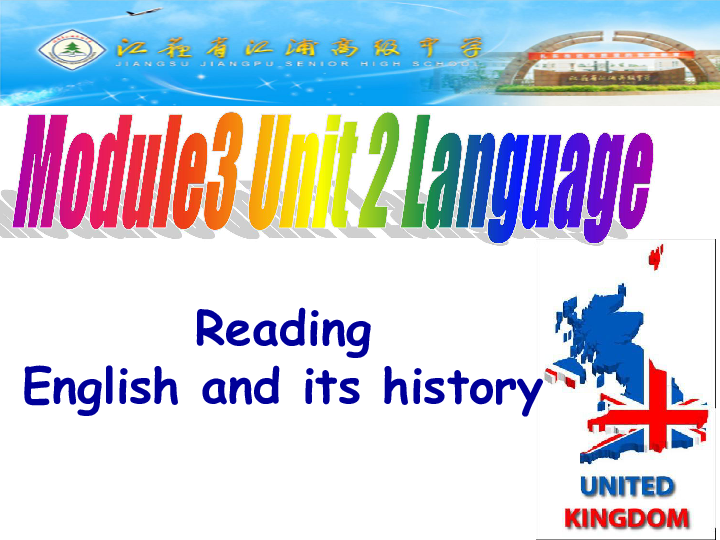
课件31张PPT。Module3 Unit 2 LanguageReading English and its historyEnglishReadingand its history▲ Learning about language——— Discovering useful words and expressions课文原句1. All through history, people from many different countries and cultures have lived together in Britain. all through history 贯穿历史 自始至终 = all over the world 遍及 = throughout the world 遍及整体整体 be made up of 部分 = 整体 consist of 部分 不用于进行时或被动语态 部分 make up 整体 is made up ofmake upconsists of课文原句部分2. The English language is made up of the grammar and vocabulary these people brought to Britain.be made up of我们班由57个学生组成。 Our class 57 students. 57 students our class. Our class 57 students. 指出下列句中make up的含义。 ①They made him up as an old man for the last act of the play. ( ) ②I'm trying to make up the time I lost while I was sick. ( ) ③We made up the bed in the spare room. ( ) ④He is good at making up stories. ( ) ⑤Women make up 56% of the student numbers.( ) 化妆弥补铺床,临时搭床编造(故事,谎言)占,形成,构成 make up 一词多义That/This/It is why … 那是为什么… why引导的表语从句表示结果。 That/This/It is because … 那是因为… because引导的表语从句表示原因▲Jack was late for class today. _____ he got up late this morning. ▲ Jack got up late this morning. _____ he was late for class today.That is becauseThat is why3. That is why English has so many difficult rules that confuse people.1. all through history 2. be made up of/consist of 3. grammar and vocabulary 4. That is why … 5. confuse sb1. 贯穿历史 2. 由…组成 3. 语法和词汇 4. 那是为什么 5. 使某人困惑重点词组Introduction主语 谓语 is very different from 和…不同 宾语( ) 定语从句课文原句4. Old English is very different from the English we speak nowadays. be different from 和…不同 = differ from 从句主句 课文原句5. In fact, we would not be able to understand it if we heard it today.If虚拟条件句 were/didwould/could/might/should +v原形 had donewould/could/might/should have done①were/did ②were to do ③should dowould/could/might/should + v原形 would if heard todayIf you had studied hard before, you would have passed the exam.1.如果我是你,我会接受他的建议。2.如果明天下雨,我会待在家里。3.如果你以前好好学习, 你本来会通过考试的。If I were you, I would accept his advice.If it rained/should rain/were to rain tomorrow, I would stay at home.4. You didn’t let me drive. If we _____ in turn, you _____ so tired. drove; didn’t get drove; wouldn’t get were driving; wouldn’t get had driven; wouldn’t have got5. _____ it rain tomorrow, we would have to put off the visit to the Yang Pu Bridge. Were B. Should C.Would D. Will occupy—occupied— occupied ①占领,侵占;②占据(时间,空间);③使忙碌 The table occupied too much room. The enemies occupied the city. The meeting will occupy half an hour. 忙于/专心于某事 occupy sb./oneself in doing sth/with sth. be occupied in doing sth. /with sth. He occupied himself in doing homework.7. Both the English language and the English people are na ... ...
~~ 您好,已阅读到文档的结尾了 ~~

